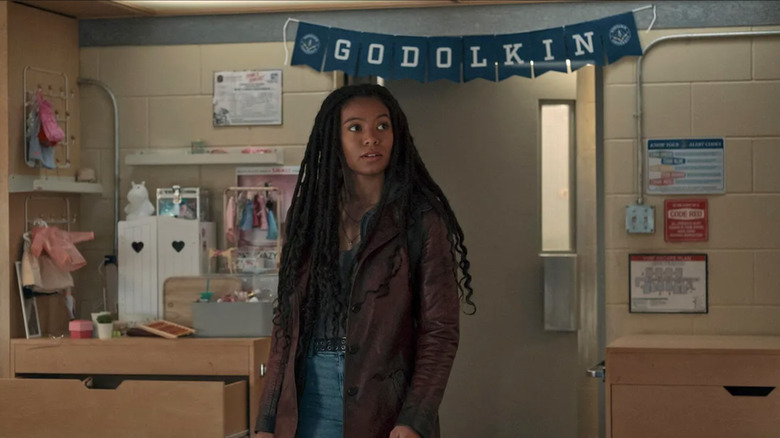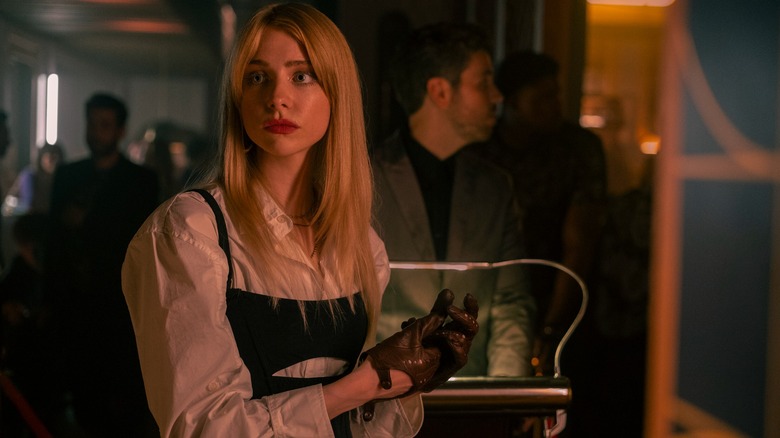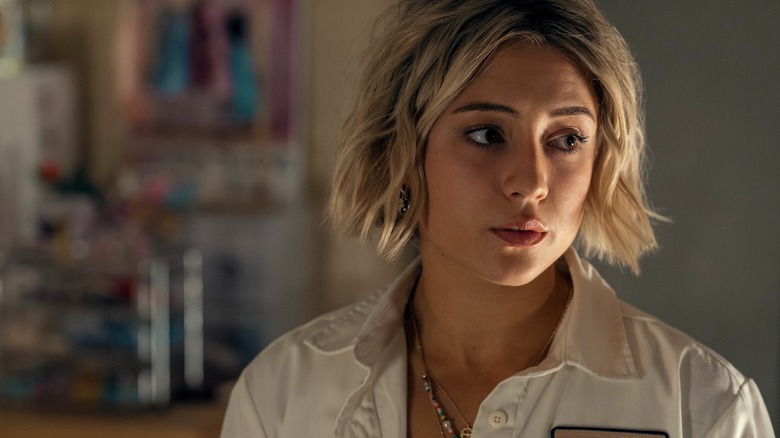Like The Boys, Gen V's Sharpest Satire Reflects Real Life
This post contains spoilers for the first three episodes of "Gen V."
Eric Kripke's "The Boys" pushed the boundaries of what's traditionally considered to be irreverent storytelling, while delivering sharp, relevant social commentary that directly reflected our immediate reality. From the blatant exposé of capitalist megastructures that often guise their evil with performative activism and acts of charity to portraying the rot of right-wing extremism that firmly grips various societal strata, "The Boys" ventures into satire that is as layered as Vought International's repugnant conspiracies to fool the world.
Enter "Gen V," a "The Boys" spin-off that doesn't rely too hard on its parent show to stand on its own, as it flaunts a fresh brand of ultraviolence and lawlessness, framed within the context of a younger group of characters at Godolkin University. While the adults in "The Boys" often flaunt their cruelties and revel in it, the youngsters in "Gen V" are still impressionable, molded by a world hell-bent on manipulating their trajectories for their own purposes. After all, Godolkin is akin to a talent-testing ground that feeds directly into Vought, which ruthlessly profits off Supes, no matter where they stand in the public rankings that determine their value and worth. In "Gen V," these machinations take a darker turn by impacting teenagers who are still figuring out their place in such a volatile world.
Yes, there's copious amounts of blood, and ample nudity — a DNA that the spin-off shares with its predecessor — but the commentary here is more pointed, as they hold a mirror to the anxieties and horrors that impact the youth today. While still hilariously exaggerated in tone and treatment, "Gen V" never lacks heart when it matters the most, especially when it comes to Marie (Jaz Sinclair), a bloodbender with dizzying ambitions.
Survival of the most popular
Being a beloved member of "The Seven" does not hinge on the quality of superhero work or a genuine intent to save the world. Instead, it lies in fabricated social media campaigns to make these heroes appear a certain way, or the shrewd manipulation of crisis situations to twist truths in the company's favor. Godolkin employs such tactics by promoting the school as a safe haven for all Supes: a fair, free space that is accepting of everyone, offering equal opportunities for all to help pave the path to superhero stardom. The truth, however, is more cruel and unforgiving, as Godolkin epitomizes toxic academia, rife with barely-concealed racism, abusive power hierarchies, and gross exploitation.
Marie's ambition to become numero uno on the school's board meets immediate obstacles once she is accepted into the school, as her traumatic past and lack of social clout contribute to how she is perceived by those in power. Racial discrimination plays a part, for sure, but her bloodbending powers are deemed too weird even by Vought standards — it is too gory to market to any demographic, and isn't as "cool" as a dude setting himself aflame to beat enemies up (Luke Riordan / Golden Boy, who is number 1 on the board, by the way). When she joins, Marie doesn't even have an Instagram, and as someone forcefully assigned to the Crimson Countess School for Performing Arts with no interest in the subject, she is but good as doomed.
If Marie wishes to see her name in the Top 10, she needs to play the sick game of numbers, which comes with an obsession with social media metrics and performative theatrics to create a marketable social media self. The path ahead is bleak.
Gen V and its struggles
The sincere desperation to be seen in a market saturated with Supes with varying capabilities (and unfair advantages) is as tough as it gets. For instance, Emma (Lizze Broadway), the size-morphing Supe who goes by Little Cricket on her YouTube channel, has to rely solely on her ability to become smaller to entertain audiences and rake up the numbers. When it is revealed that she throws up regularly to accommodate this transformation, this is used as a weapon to boost her popularity. There's an obvious attempt to convey the relationship between disordered eating in teens and twisted social media perceptions that feed into it, where personal hells evolve into commodities peddled for the slim chance of being seen, and hopefully, being valued by countless unknowns on the internet.
The saying, "Comparison is the thief of joy" feels hollow in a world that functions on comparative rankings that directly dictate the quality and tone of one's reality, as social clout also determines what specializations and courses students must take. Add the Compound V traumas that affect adolescent minds that are already high on emotions, hormones, and a need to prove themselves to the mix, and we have a recipe for disaster, often leading to bursts of violence and debauchery. The substance abuse allegories touched upon here are never too on the nose but are present nonetheless, grouped with the rising necessity to "fit in" if you ever want to amount to anything at Godolkin.
Vought's hypocrisy is on an unbelievably glib display, as usual, and the first three episodes cement the ruthlessness of a world teeming with Supes, squashed under Vought's thumb, with no way to escape.
The first three episodes of "Gen V" premiered on Prime Video on September 29, 2023.


